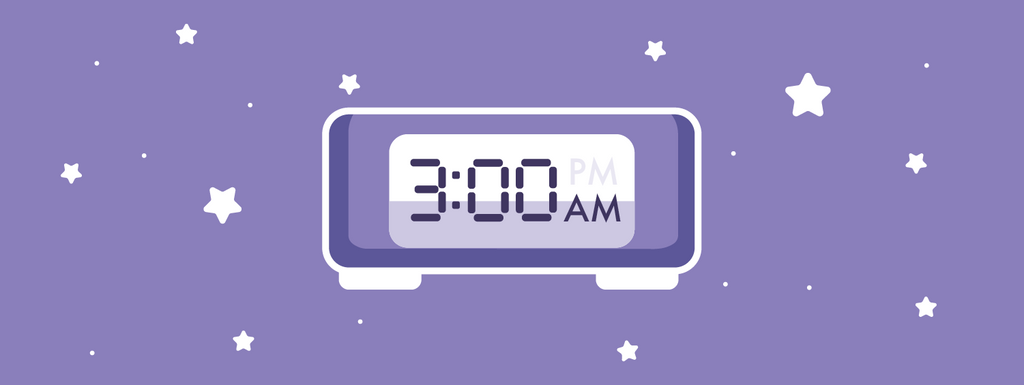Waking up in the middle of the night can be exhausting and even disruptive to your sleep cycle if it becomes a regular occurrence.
Here are some reasons you might be waking up at night and what might help stop it.
(While we want to preface that melatonin supplements are not designed to treat or cure sleep disorders, it might help some people deal with some forms of sleep issues.)
Reasons for trouble staying asleep
More than 50 million people struggle with a sleep disorder.
Finding out why you’re waking up in the middle of the night is unfortunately case by case. There's many reasons why someone could be having trouble sleeping- from stress, to anxiety, to sleep disorders like insomnia where people find it difficult to fall asleep or stay asleep through the night.
Different reasons will ultimately affect the course of action needed to address those issues.
For example, light sleepers and people wake up easily to light disturbances might want to start with noise-canceling headphones or changes to their sleep environment, rather than sleeping pills which have warnings against long-term use and significant side effects.
Insomnia is characterized by either difficulty falling asleep, not getting enough restorative sleep, or not being able to stay asleep. It's one of the most common sleep disorders, with over 30% of adult people experiencing it at some point in their lives.
People may experience insomnia very differently, since insomnia does not have one single cause. For some people, insomnia might be a symptom of another underlying cause or condition.
Health conditions like sleep apnea might also contribute to difficulty sleeping. With sleep apnea, your breathing stops and restarts as you sleep which can prevent you from getting enough oxygen. This can disrupt sleep, resulting in feeling like you didn’t get enough sleep.
Anxiety or depression- or both- can also be a source of insomnia. A study found that more than half of people suffering from depression have difficulty sleeping at night. Another found that stress tends to exacerbate sleep reactivity, which correlates to greater tendency to experience difficulty sleeping.
Other reasons you might not be able to sleep include:
- Short-term stress or anxiety
- Feeling pain or discomfort at night
- Poor sleep hygiene, such as using devices late at night
- Jet lag
- Underlying health disorders or conditions
Situational causes like jet lag might resolve in a few nights on their own. But if you’re experiencing chronic difficulty sleeping, this might affect your quality of life for longer-term.
Lack of sleep leads to greater issues
Not getting enough sleep for a few nights might make it hard to get out of bed the next morning, but it doesn't seem like such a sever issue. However, chronic lack of sleep can have more debilitating effects on your health and your daily life.
Sleep is an essential part of maintaining your health. When you sleep, you recover energy lost during the day and replenish functions that are essential for growth and physical wellness.
Sleep is important for hormone regulation, muscle repair, tissue growth, hormone regulation, brain development, and other functions that have a major impact on your health.
A lack of sleep can impair your ability to think creatively, your working memory, and your ability to pay attention. Poor concentration and cognitive function, impaired memory, and exhaustion could greatly hamper your day to day life such as at work or school.
Sleep deprivation also greatly increases your risk of getting in motor accidents caused by impaired driving.
Other side effects of sleep deprivation include:
- Poor motor capabilities or control
- Increased stress or agitation
- Poor mood regulation
- Daytime exhaustion
- Grogginess and poor mental cognition
- Lack of focus and memory
Long term or chronic sleep deprivation is correlated to increased likelihood of developing conditions such as obesity, cardiovascular diseases, diabetes, hypertension, and other conditions that could impact your health.
The repercussions of a severe lack of sleep can be massive. This is why it’s essential to get enough restorative sleep and also practice good sleep habits.
The average adult needs about 7 to 9 hours of sleep.
Can I use melatonin to go back to sleep?
For many people, melatonin is a safe and effective sleep aid to help their sleep issues.
Melatonin helps regulate your sleep-wake cycles and signals to your body to transition into sleep. Taking melatonin close to bedtime should initiate this cycle and onset sleep at the intended time.
You could use melatonin to reinitiate that cycle if you wake up in the middle of the night. Doing so should not cause any negative side effects if used responsibly. But be careful not to take too much melatonin- especially if you’ve already taken some prior to waking up.
Look out for signs that you may have taken too much melatonin:
- Headaches
- Nausea
- Dizziness or grogginess
- Feeling tired in the morning
- Elevations or drops in blood pressure
- Nightmares
- Agitation or mood swings
The average recommended dose for healthy adults is anywhere between 0.5mg to 10mg. The dose should be adjusted for children, elderly people, and people who have health conditions that might affect their sensitivity to melatonin.
We suggest starting with the smallest amount possible before increasing to higher doses to minimize the possibility of experiencing side effects from taking too much melatonin.
Could melatonin keep me awake?
Melatonin shouldn’t be keeping you awake, as its supposed to initiate your sleep cycle. If you feel that melatonin is keeping you awake, consult with your physician about finding a sleep aid that works best for you.
